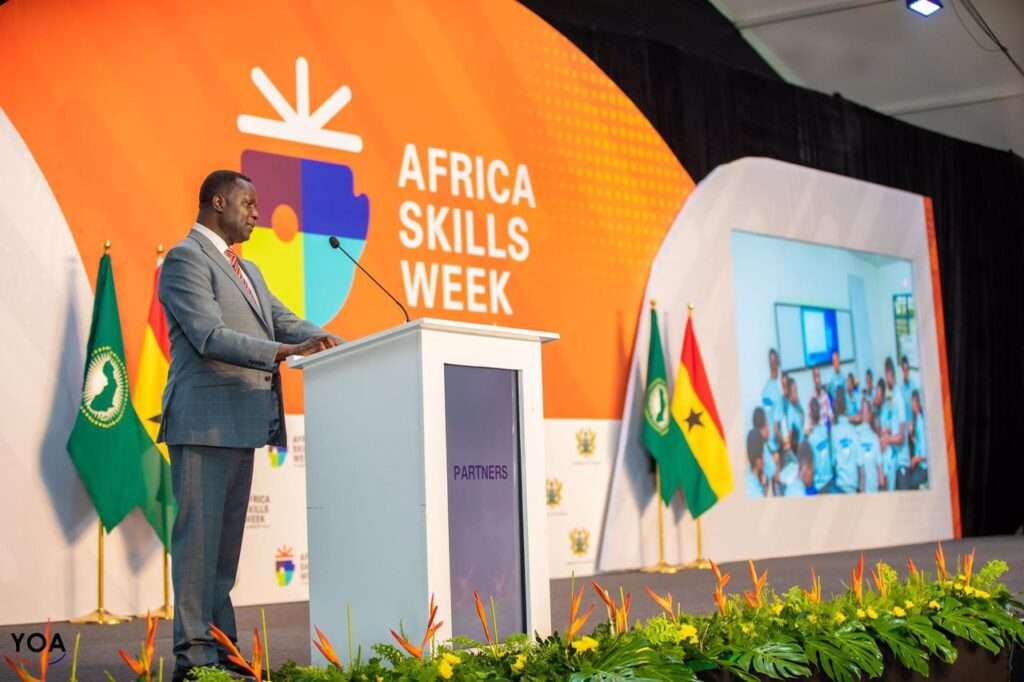The Minister for Education of Ghana, Dr. Yaw Osei Adutwum, has once again underscored the pivotal role of Technical and Vocational Education and Training (TVET) in advancing Africa’s industrialisation.
During his keynote address at the 2024 Africa Skills Week, held in Accra, Ghana, the Minister emphasised the critical contribution of TVET to economic development and its importance in driving innovation and job creation across the continent.
In his address, Dr. Adutwum reiterated that without a skilled workforce, the industrialisation agenda of African nations would remain unachievable.
“Our government recognises that industrialisation is not possible without the technical skills to drive it,” the Minister remarked, stressing that the development of technical competencies through vocational training is fundamental to Africa’s economic transformation.
This year’s Africa Skills Week, a high-profile event, brought together policymakers, educators, industry leaders, and other stakeholders to discuss TVET’s future.
The event was themed, “Boosting Excellence and Innovation in TVET: Interregional Policy Dialogue and Global Agenda Setting,” highlighting the need for enhanced dialogue and cooperation between regions to ensure TVET systems align with both national and global industrialisation goals.
Ghana has long championed TVET reforms under the leadership of President Nana Addo Dankwa Akufo-Addo, who has continuously pushed for a “Ghana Beyond Aid.”
Dr. Adutwum’s comments reflect this commitment, positioning TVET as central to this vision, which aims for Ghana to achieve self-reliance by nurturing a workforce capable of supporting industrial growth and fostering sustainable economic independence.
Ghana’s commitment to TVET reforms has produced significant achievements, particularly through its Free TVET policy. The policy has shifted public perceptions of vocational education, which was once viewed as a “last resort” for students with limited academic prospects.
“TVET is no longer seen as a last resort but as a premier path for young people who want to contribute to the development of their nation.”
Dr. Yaw Osei Adutwum, Minister for Education of Ghana
Dr. Adutwum highlighted how the policy has dramatically increased enrolment numbers, indicating a growing recognition of the value of technical skills in building the nation.
In addition to boosting enrolment, Dr. Adutwum noted that the government has invested heavily in upgrading TVET infrastructure, modernising curricula, and making vocational education more accessible and affordable. Key initiatives such as the Ghana Jobs and Skills Project and the Competency-Based Training (CBT) model have been pivotal in this transformation.
These initiatives according to the minister aim to align education outcomes with the practical needs of industries, ensuring that students graduate with the relevant skills required to thrive in the job market.
Bridging the Gap Between Education and Industry

One of the core challenges historically faced by vocational education systems in Africa has been the mismatch between training and industry needs. To tackle this, Ghana has introduced reforms designed to bridge the gap between education and employment, aligning TVET curricula with the demands of key sectors such as automotive, oil and gas, ICT, and renewable energy.
In his address, Dr. Adutwum praised the role of the Sector Skills Bodies (SSBs), which have been instrumental in this alignment process. “We have bridged the gap between education and industry,” he said.
The importance of TVET extends beyond Ghana, with Dr. Adutwum calling for increased collaboration among African nations to address shared challenges, particularly youth unemployment.
Africa’s youth population is one of the fastest-growing in the world, and without concerted efforts to create job opportunities through skills training, the continent could face significant socio-economic challenges.
“Africa must unite in its approach to skills development,” Dr. Adutwum urged. He emphasised the need for African countries to share best practices, foster interregional cooperation, and leverage their collective expertise in skills development.
Dr. Adutwum reaffirmed the country’s dedication to global policies, particularly the UNESCO Strategy for TVET 2022-2029, which aims to enhance TVET systems globally by promoting inclusiveness, sustainability, and innovation.
“We will continue to champion the role of skills in shaping Africa’s future,” Dr. Adutwum concluded, reaffirming Ghana’s leadership in the TVET space. He also urged global partners to continue supporting TVET initiatives that empower African youth, emphasising that “TVET is the future of work, and Ghana is leading the way.”




















